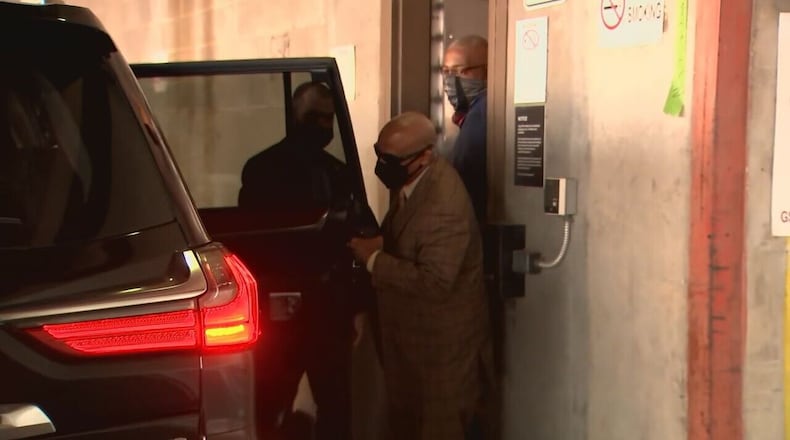Prosecutors plan to call 35 witnesses to testify against Clayton County Sheriff Victor Hill in his trial next month on federal charges of violating the civil rights of seven detainees at the south metro Atlanta community’s jail.
In a pre-trial hearing Thursday before U.S. District Judge Eleanor Ross, prosecutors said they anticipate they will need two- to two-and-one-half weeks for the trial, which will get underway Oct. 12 in the Richard B. Russell Federal Building in downtown Atlanta.
“We are going to look for efficiency,” Brent Gray, the lead federal prosecutor, said in explaining that many of the witnesses called will testify to overlapping charges.
Hill, the controversial and longtime sheriff, was indicted in April 2021 on charges of violating the civil rights of the detainees by strapping them into restraint chairs as punishment.
Prosecutors said all seven detainees will testify, including a man strapped to a restraint chair after allegedly vandalizing his home when he was 17. Also testifying will be a Butts County landscaper who prosecutors said was sent to the chair because of an argument he had with Hill over work the man did for a Clayton deputy.
Hill, who was in attendance at the meeting wearing a natty gray suit, has pleaded not guilty to the charges. It was not clear whether he will testify in his own defense.
Gov. Brian Kemp suspended Hill from duty in June 2021 pending the outcome of the charges.
The trial will include 12 jurors and two alternates, Ross said. Jurors will fill out questionnaires from which attorneys can scrutinize. The judge will pool about 32 potential jurors and then stop, letting the attorneys weed them down from there.
Prosecutors alleged at the hearing that despite subpoenas and search of the sheriff’s office in Clayton, they had only received one or two of the videos they requested of detainees in connection with the restraint chairs as well as four of the seven “use of force” reports they sought. It was unclear if they were alleging obstruction of justice against the Clayton Sheriff’s Office.
Much of Thursday’s pre-trial hearing centered on arguments the defense and prosecution would or would not be permitted to make during the trial. Judge Ross, for instance, nixed defense discussions about Hill’s good deeds in the community, but said she would permit them if they came up organically in witness testimony.
But Hill’s self descriptions of himself as “Batman” is out. The sheriff often uses the bat signal and other crime fighting attributes of the DC Comics hero in social media to describe his battle with criminals.
“The jury will just have to wonder what that is,” the judge said, as Hill and his attorneys chuckled.
Ross also limited how much prosecution witnesses, many of whom will include deputies or jailers who have worked for Hill, would be allowed to say about why they complied with the lawman’s instructions. Prosecutor Bret Hobson argued that the testimony is necessary to demonstrate that Hill’s staff fear him, a statement to which Hill shook his head.
Hill allegedly told staff that if they did not follow his instructions he would “cut your head off and kick it down the hall,” Hobson said.
But Ross said she was concerned that allowing complaints about Hill’s methods would create little mini-trials about the sheriff instead of what happened to the detainees.
“The most they can say is, ‘I did it at his direction,’” Ross said of the witnesses.
Arguably one of the biggest sticking points was whether Hill’s attorneys could explain that the restraint chairs were integral to how the sheriff instilled discipline at the jail. Detainees are expected to face the wall when Hill enters a room, are often put on suicide watch for their own safety and are fed Nutraloaf if they get out of line.
“Nutraloaf” is a meatloaf mixture that critics say is often used as punishment in jails and has been banned in at least three states. The ingredients of “nutraloaf” vary from state to state, but often begins with ground beef and then is mixed into a loaf with a variety of foods, including beans, vegetables, unskinned potatoes, dry grits and oatmeal.
“The restrain chair was part of that story,” defense attorney Lynsey Barron said. “You can’t isolate it.”
Ross said she would let both sides present some information about jail operations, but said it would be narrow. The focus would need to tightly relate how those operations connect to the restraining detainees in chairs, not how Hill created discipline in general.
“I’m going to keep the trial tightly reined in,” Ross said.
About the Author
The Latest
Featured

